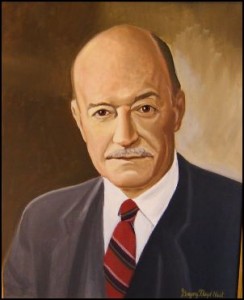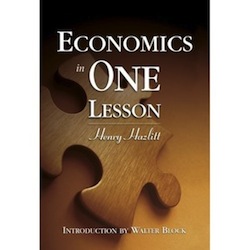 What are the causes of America’s economic problems? The most common response today, at least in Washington, DC, is that the top one percent are prospering at the expense of the ninety-nine percent. And the standard solution is for government to get tough with the business community, tax the rich, and “redistribute the wealth.”
What are the causes of America’s economic problems? The most common response today, at least in Washington, DC, is that the top one percent are prospering at the expense of the ninety-nine percent. And the standard solution is for government to get tough with the business community, tax the rich, and “redistribute the wealth.”
I recently revisited a classic book that offers a very different perspective: Economics in One Lesson by American economist and philosopher Henry Hazlitt. This slender, lucid volume is filled with thought-provoking ideas about today’s most vexing problems. Ironically, it was first published more than six decades ago!
In it, Hazlitt exposes the common fallacies about economics, notably the tendency to press for private agendas at public expense, and the habit of making policies on the basis of short-term benefits to one group and to ignore the long-term impact on all groups.
Every chapter offers answers to the questions that still confound government officials and academics. Here is a brief sampling:
Is the pursuit of profit a bad thing? Many say it is, citing the billions of dollars in profit corporations earn from consumers as evidence of “corporate greed.” Such people demand that government do more to regulate business. In contrast, Hazlitt argues that profit occurs when someone discerns a product or service is needed and finds a way to provide it at an attractive price. When private individuals or companies produce goods or services that are not needed or affordable, they fail and go out of business. Governments, however, lack the discernment necessary to make sound decisions and, because they use other people’s money, are undeterred by failure. That, he concludes, is precisely why government involvement in business is a bad idea.
Does technological advance cause unemployment? This notion has produced a number of unfortunate effects, including union pressure to retain jobs even when innovation has made them obsolete. Hazlitt demonstrates that new inventions create as many or more jobs than they eliminate. But his most devastating argument against fear of invention is that if technological advance really caused unemployment, then logic would demand we categorically oppose it. In that case, he says, we would end up reasoning as follows: “Why should freight be carried from Chicago from New York by railroad when we could employ enormously more men . . . to carry it all on their backs?”
Is deficit spending the solution to unemployment? This idea has been more mindlessly embraced in our day that in Hazlitt’s. (Our deficit is now over sixteen trillion dollars and rising.) Hazlitt points out this idea has repeatedly been shown to be false. He adds that the acceptance of deficit spending not only worsens economic conditions; it also obscures “the real causes of unemployment, such as excessive union wage-rates, minimum wage laws, excessive and prolonged unemployment insurance, and overgenerous relief payments.”
Will “printing” more money help the economy recover? The perennial answer of government officials is “yes.” But Hazlitt points out that printing money causes inflation, and inflation is not just a form of taxation but the “worst form” because it hurts the poor more than the affluent.
Are government efforts to redistribute wealth beneficial? As anyone who watches the news knows, “redistribution of wealth” is the dominant political slogan of the day. Hazlitt argues that, far from being beneficial, such initiatives generally “smother productive incentives and lead toward general impoverishment.” He concludes that “it is the proper sphere of government to create and enforce a framework of law that prohibits force and fraud. But it must refrain from specific economic interventions. Government’s main economic function is to encourage and preserve a free market.”
In the 1978 edition of this classic book, Hazlitt added a final chapter in which he lamented that in the 32 years since it was first published, politicians had learned none of its lessons. Regrettably, their refusal to learn continues to this day and now poses an even greater threat to America’s future.
Copyright © 2012 by Vincent Ryan Ruggiero. All rights reserved
